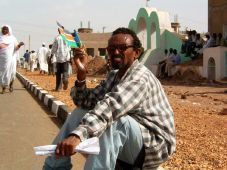S. Sudanese unhappy with new government
Sept 21, 2005 (KHARTOUM) — Southern Sudanese said on Wednesday they were unhappy with the composition of the country’s new unity government and one observer described it as a humiliation for the former rebels brought into the cabinet.
 Southern politicians said more key posts, particularly the critical Energy Ministry which was retained by Khartoum, should have been allocated to the former rebels of the Sudan People’s Liberation Movement (SPLM).
Southern politicians said more key posts, particularly the critical Energy Ministry which was retained by Khartoum, should have been allocated to the former rebels of the Sudan People’s Liberation Movement (SPLM).
“The SPLM should not have given in on the issue of the Energy Ministry,” said William Ezekiel, acting editor-in-chief of the Khartoum Monitor, a newspaper that concentrates on southern issues.
Referring to Salva Kiir, first vice-president in the new government and president of southern Sudan, Khartoum Monitor columnist Michael Koma, went further: “The best thing after this sheer humiliation is for Salva to step down from the presidency of the south.”
Other voices were less dismissive of the new government.
“I am not 100 percent satisfied but it is a step in the right direction,” said Ghazi Suleiman, an SPLM parliamentarian.
A Western observer said the new government was Sudan’s most representative in more than a decade.
A tussle between the National Congress Party (NCP), which makes up 52 percent of the government, and the SPLM over control of the budding oil producer’s oil ministry delayed the formation of the government.
SPLM officials have said control of the Energy Ministry will be rotated between the former ruling party and the SPLM, however the former information minister said was no such agreement.
Many of the oil wells are in the south and the SPLM has said oil revenue is vital for developing the region after the 21-year civil war, which ended with a peace agreement in January.
“This government is not really representative of the demands of the southern people or other marginalised people in the country,” said Ezekiel.
The former ruling party, the National Congress Party (NCP), retained control of the defence, interior, energy and finance ministries. Lam Akol, an SPLM official, became foreign minister.
According to the Western observer, the new government would pave the way for parliamentary elections in about three years by allowing political parties to participate in government and opposition.
The observer also said the new power-sharing arrangement would require the parties to cooperate in implementing other requirements of the peace deal, such as formation of military units with SPLM troops.
David Mozersky of the International Crisis Group (ICG) think-tank said Sudan’s new government had to now tackle major challenges, including a revolt in the east of the country and the continuing rebellion in the western region of Darfur.
Rebels in Darfur have said they seized a town in the area from the government, which has vowed to recapture it. Aid officials have expressed fears for the security of civilians if violence escalates.
(Reuters/ST)
